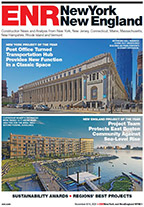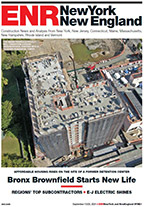After two decades of developing and acquiring research facilities, Alexandria Real Estate has done some experiments of its own in recent years. With a list of tenants that includes multinational pharmaceutical companies, biotechnology firms, academic institutions and other entities with an interest in research and development, Alexandria Real Estate specializes in delivering complex laboratory and administrative spaces. In an effort to improve the quality and predictability of its projects, ARE is encouraging its designers and contractors to leverage emerging techniques and technologies on its latest developments. The results are already paying off for ARE while simultaneously helping advance industry practices. In light of its portfolio of work and its advocacy for innovation, ENR New England named Alexandria Real Estate its 2015 Owner of the Year.
The largest real estate investment trust focused on life science campuses in urban clusters, California-based ARE is currently in seven major metro markets in the U.S., including Boston. In the greater Boston area, its portfolio includes nearly 3.8 million sq ft of facilities in operation, 1.7 million sq ft of future properties in development and 112,500 sq ft of space under redevelopment.
Tom Andrews, executive vice president and regional market director for greater Boston, joined the firm when it entered New England with the purchase of the Massachusetts Biotechnology Research Park in Worcester, Mass., in 1998.
"When I first came in, the company goal was to be the landlord of choice for the life sciences industry," he recalls. "When they want to expand, we want them to think of us. I think we've achieved that goal."
Part of that expansion plan included creating a cluster of properties within Boston's urban core. The company officially planted its flag with the $600-million purchase of Technology Square in Cambridge from MIT in 2005—it now houses roughly 1.2-million sq ft of leasable space.
From there, the company's focus shifted to nearby Kendall Square, where it has plans to develop multiple facilities, primarily along Binney Street.
With these two clusters, Alexandria is not only entrenched within the urban core, it's located near both MIT and Harvard University. Andrews notes that its strategy is in line with demand among life science firms to be centrally located near major higher educational facilities. "There's been a shift where more life science research occurs in urban settings," he says. "Biotech companies and pharmaceutical companies collaborate in smaller groups with more flexible teams. It's no longer just about large suburban campuses."
Andrews adds that its model is also attractive to millennials who want to work in an urban environment.







Post a comment to this article
Report Abusive Comment